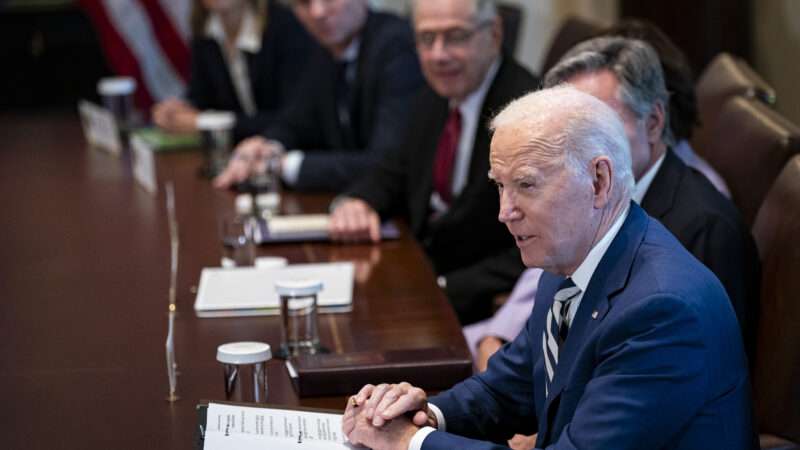
U.S. lawmakers, afraid of competition from China, have advocated for President Joe Biden to make products more expensive for Americans. Unfortunately, Biden may do it.
In a November letter to U.S. Trade Representative Katherine Tai, a bipartisan group of lawmakers urged the Biden administration to raise tariffs on electric vehicles (E.V.s) imported from China. Under President Donald Trump, the U.S. imposed 25-percent tariffs on hundreds of billions of dollars worth of Chinese imports. (Imported automobiles already receive a 2.5-percent tariff across the board.) Since taking office, Biden has allowed Trump's tariffs to remain in place, worsening inflation and costing Americans billions of dollars in higher costs.
The November letter—signed by Reps. Mike Gallagher (R–Wis.) and Raja Krishnamoorthi (D–Ill.), among others—argued that for E.V.s, 25 percent is too low. "It is critical that tariffs on PRC automobiles not only be maintained but also increased to stem the expected surge in PRC imports," the letter warned, using the acronym for the People's Republic of China. "It is only a matter of time before PRC manufacturers will be able to absorb the additional 25 percent tariff on PRC vehicles to access the U.S. market."
Over the weekend, Axios reported that "the Biden administration is moving toward keeping many of former President Trump's controversial tariffs on some $300 billion in Chinese imports in place, and aims to increase duties on electric vehicles and some critical minerals," such as the rare earth metals used to make E.V. batteries. The 2022 Inflation Reduction Act also provides tax credits to Americans who purchase E.V.s but is limited only to those sourced and assembled in North America.
The Axios report speculated that Biden could raise tariffs in order to be competitive in his reelection bid against Trump, as a means "to undermine any attempts by Trump to cast Biden as 'soft' on the Asian powerhouse." But the tariffs have a real impact on Americans' wallets by making products less affordable.
"The Biden administration conversations have picked up recently as officials grow concerned about Chinese clean-energy exports, which are flooding global markets at low prices as China's domestic economy slumps," The Wall Street Journal wrote in December. "U.S. officials worry that American companies, even with the protection of existing tariffs and new subsidies, won't be able to compete with China's production."
While the administration is concerned about American companies' ability to compete with China, it seems to care little about American people who may enjoy the ability to buy energy-efficient products at a steep discount.
The Chinese government aggressively subsidized E.V. production for more than a decade, and manufacturers followed the money. Chinese manufacturer BYD produced five million vehicles during that time. Then, amid slowing demand, the government pared back its generous subsidies and Chinese automakers responded by dropping prices aggressively. European automakers, in turn, have scrambled to find a way to lower prices on their own vehicles to compete.
Unfortunately, tariffs on China mean American consumers are unable to take advantage of the situation. Europeans are able to buy E.V.s made by Chinese companies for less than $45,000—less than the average cost of an E.V. in America—but 25-percent tariffs make them artificially noncompetitive in the States.
And it's not just Chinese firms that are affected by tariffs: Nissan builds vehicles in China which it then sells around the world, as does Tesla. The lawmakers who called for increased tariffs acknowledged as much in their November letter: "Many of the EVs exported from the PRC are made by Western brands, such as Tesla, that have significant production capacity in the PRC. Furthermore, U.S. automakers are starting to shift the production of vehicles for the U.S. market to the PRC, such as the Buick Envision and the Lincoln Nautilus. The trend of shifting production from the United States to the PRC underscores that the current tariff level on imported vehicles from the PRC is insufficient."
Or…perhaps it indicates that American companies are making a financial decision and going where manufacturing costs are cheaper. Tariffs don't make domestic products cheaper, they make foreign-made products more expensive, leaving consumers without an inexpensive alternative to buying American.
The post Biden Considering Higher Tariffs on E.V.s Imported from China, Raising Prices for Americans appeared first on Reason.com.







